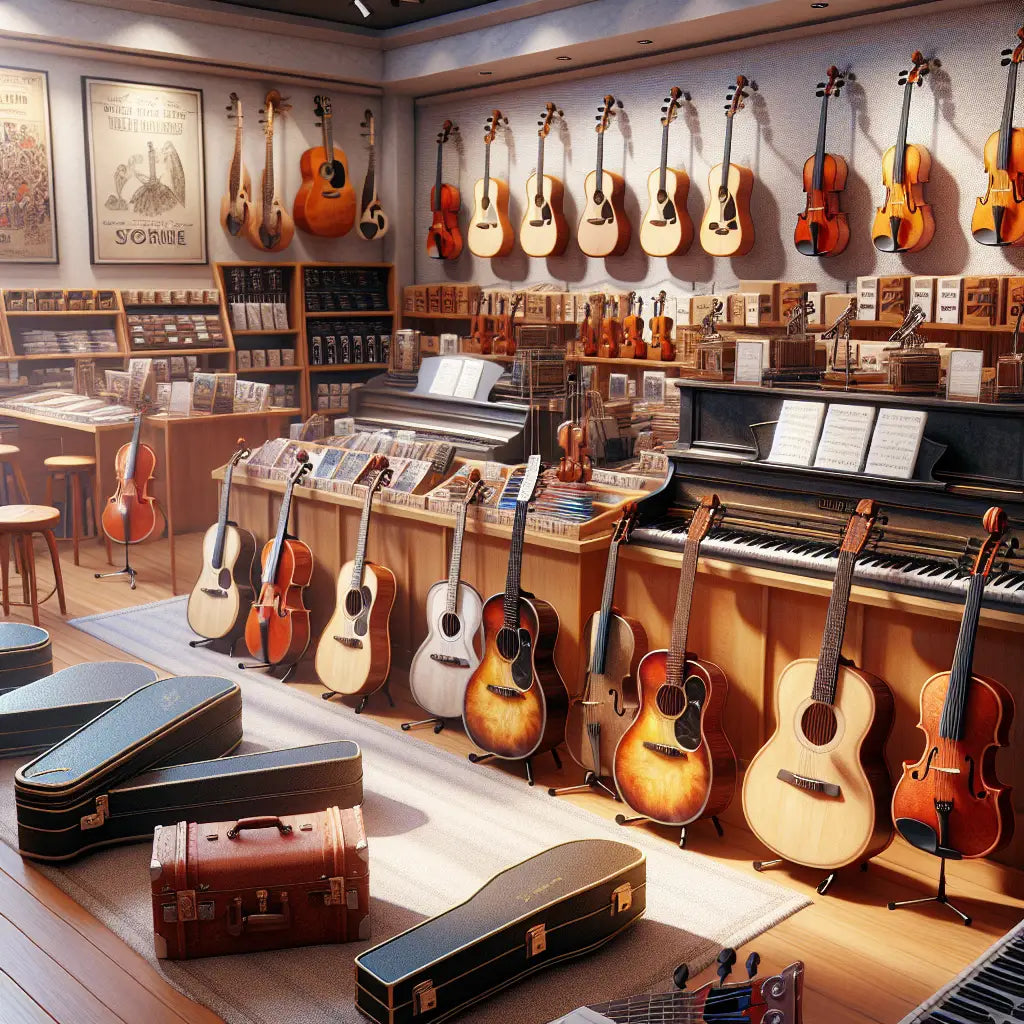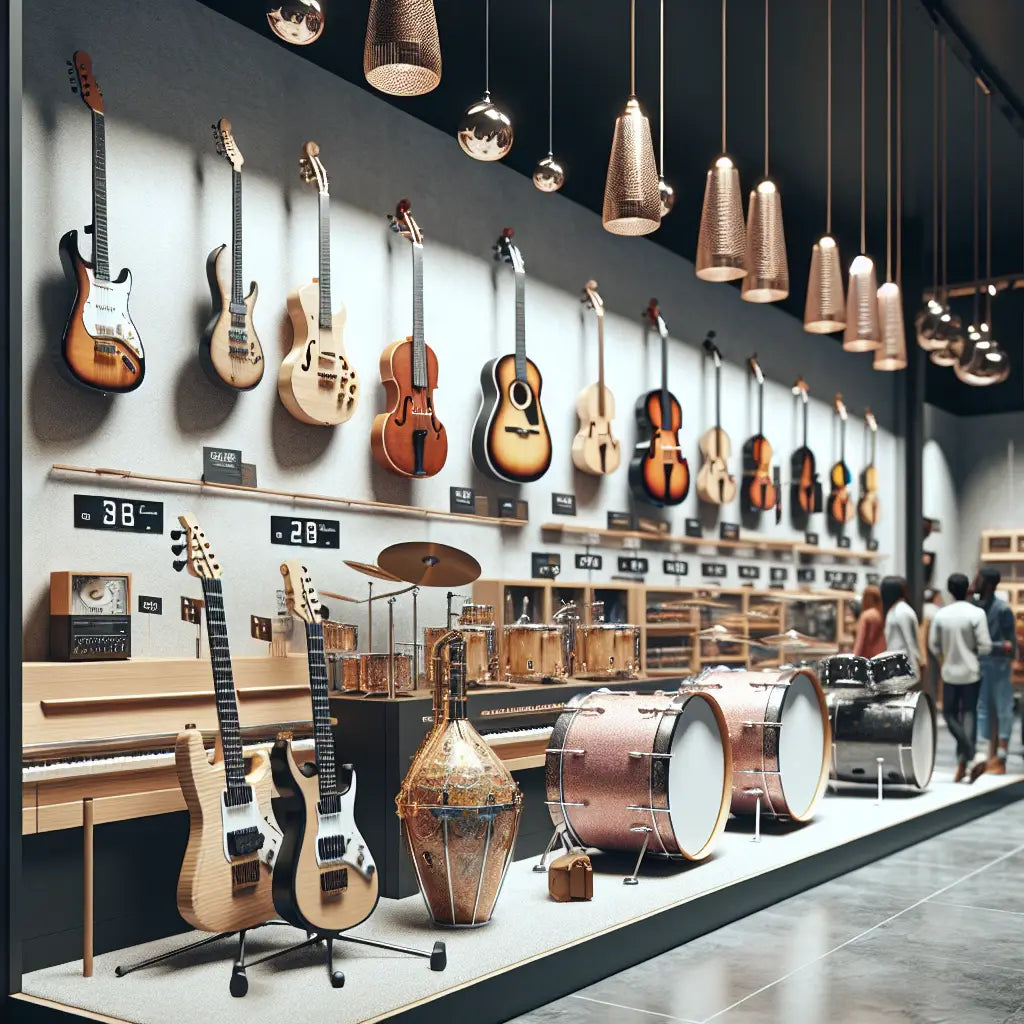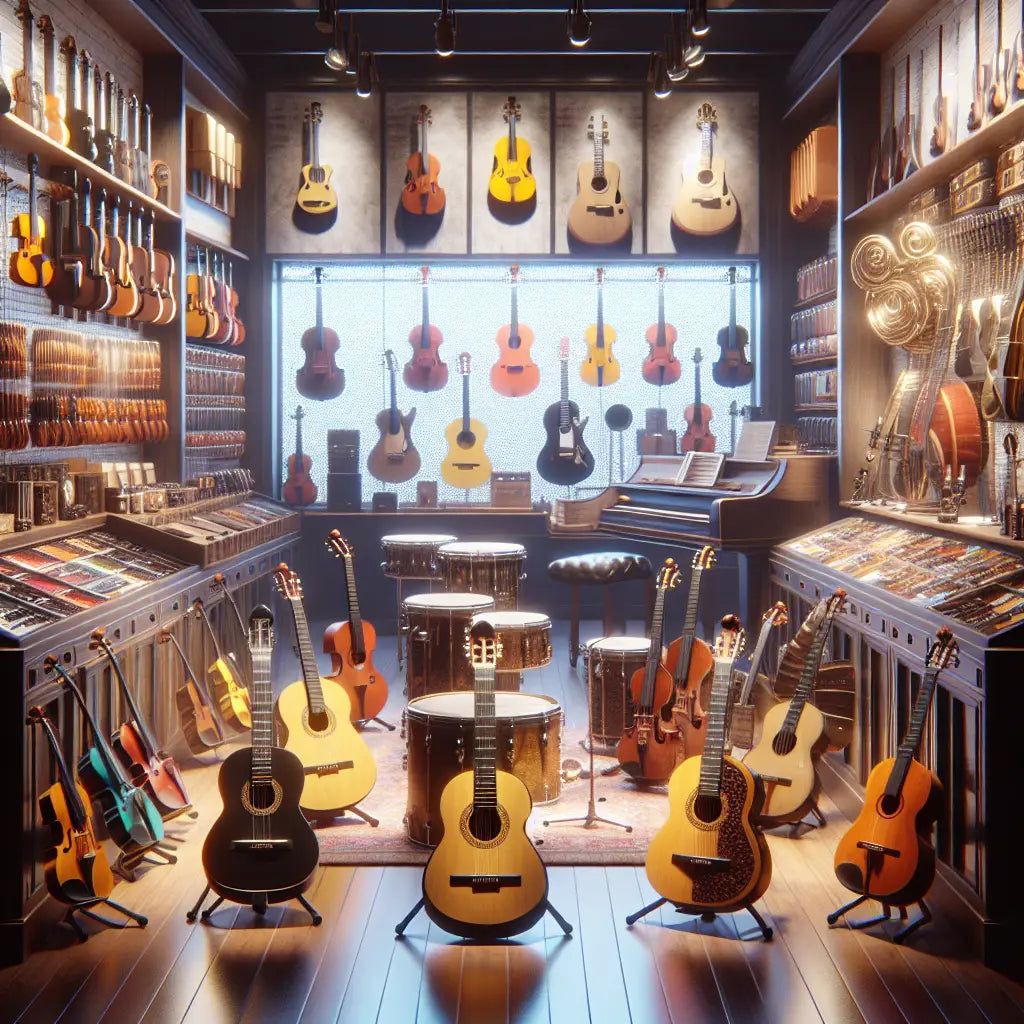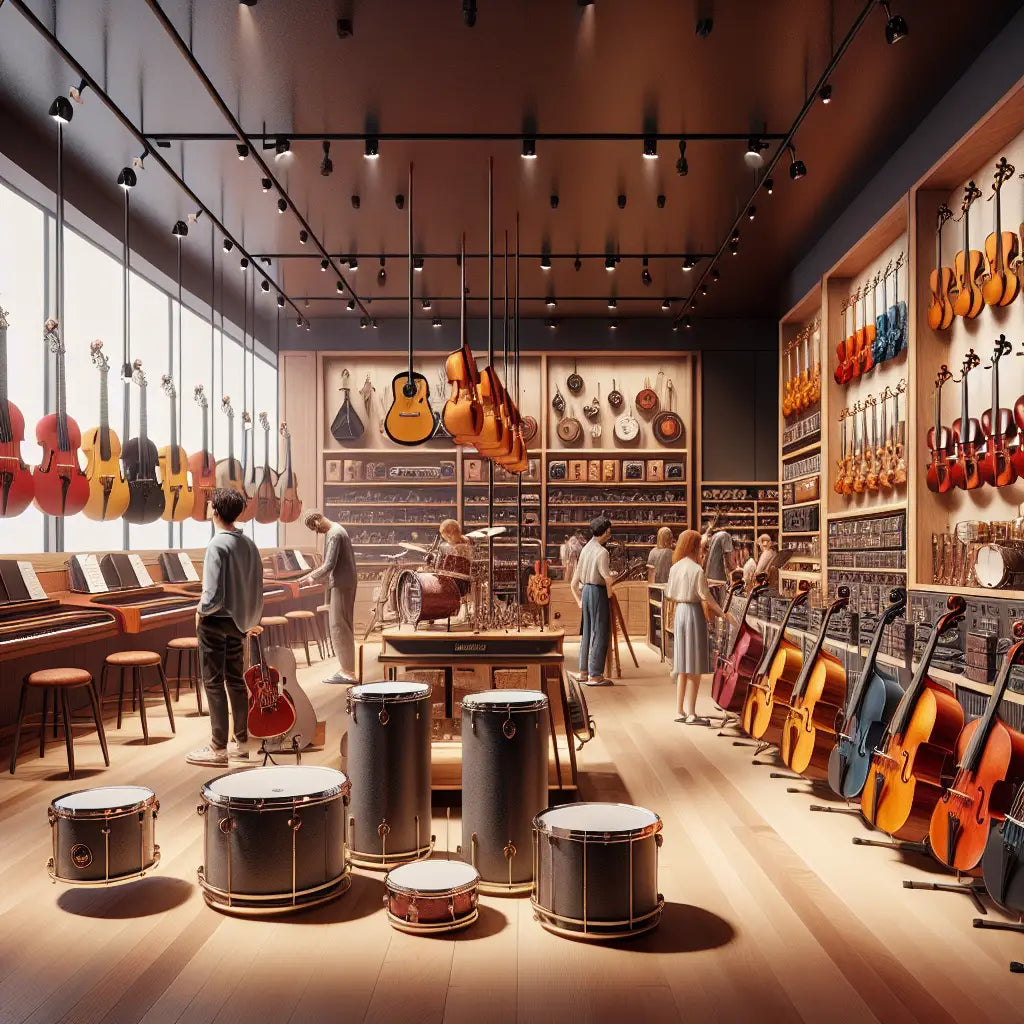When it comes to finding the perfect place to purchase your musical instruments, knowing where to start can be overwhelming. Musical instruments stores offer a wide array of options, catering to beginners and professional musicians alike. These stores are not just about selling instruments; they are a haven for music enthusiasts, providing everything from expert advice to maintenance services.
Whether you are in search of a classic acoustic guitar, an elegant piano, or a set of drums to kickstart your band, a visit to a specialized musical instruments store is essential. These stores boast a comprehensive selection of instruments from top brands, ensuring you have access to the highest quality and latest models. Additionally, the staff at these stores often include seasoned musicians who can offer valuable insights and recommendations tailored to your needs.
Another significant advantage of shopping at a musical instruments store is the chance to try out different instruments before making a purchase. This hands-on experience allows you to feel the instrument's weight, understand its sound quality, and determine if it genuinely fits your style and preferences.
Ready to explore the best musical instruments stores near you? Buy Now and Elevate Your Experience!
Why Shop at Local Musical Instrument Stores

Shopping at local musical instrument stores offers numerous benefits that you might not find when purchasing from large chain stores or online retailers. One of the most significant advantages is the personalized service. Local stores often pride themselves on their customer relationships, taking the time to understand your individual needs and providing tailored recommendations.
Additionally, local stores usually have a unique and diverse selection of instruments. They often carry rare or vintage items that you won't find elsewhere, making them a treasure trove for collectors and enthusiasts. The chance to discover unique instruments can be an exciting part of the shopping experience.
Another reason to shop locally is the opportunity for hands-on interaction. Being able to play and test the instruments in-person helps you make a more informed decision. You can feel the instrument's build quality, hear its sound, and decide if it truly meets your expectations. This immediate feedback is invaluable and can prevent buyer's remorse.
Local stores also contribute to the community by supporting local musicians and music programs. Many local musical instrument stores host events, offer music lessons, and provide a space for musicians to connect and collaborate. By shopping locally, you are investing in the local music scene and helping it to thrive.
Finally, local stores often provide excellent after-sales support, including maintenance and repair services. Having a reliable place to take your instrument for routine check-ups or emergency fixes ensures that it remains in top condition for years to come.
Types of Musical Instruments Available

When you step into a well-stocked musical instruments store, you'll be amazed by the variety of instruments available, catering to all levels of musicianship and musical tastes. From classical to contemporary, these stores offer a comprehensive range of instruments designed to suit every player.
One of the most popular categories is string instruments. This includes guitars, violins, cellos, and basses. Whether you're looking for an acoustic, electric, or bass guitar, you'll find numerous options to fit your style and budget. Violins and cellos are also available in various sizes and price ranges, perfect for both beginners and seasoned players.
Another major category is keyboard instruments. Pianos, both grand and upright, as well as digital pianos and keyboards, are widely available. These instruments come equipped with a range of features, from weighted keys to built-in rhythms and sounds, catering to classical pianists and modern musicians alike.
Percussion instruments form another significant category. Drum sets, electronic drums, and a variety of hand percussion instruments like congas, bongos, and tambourines can be found. These instruments are essential for creating rhythmic foundations in various musical genres.
Wind instruments such as flutes, clarinets, saxophones, and trumpets are also commonly available. These instruments are crucial for orchestras, jazz bands, and marching bands. Each comes in different models, suitable for beginners, intermediate players, and professionals.
Lastly, many stores offer a range of electronic instruments. Synthesizers, MIDI controllers, and drum machines are just a few of the options available for those interested in electronic music production. These instruments come with various features and capabilities, allowing for endless creative possibilities.
Tips for Choosing the Right Instrument

Selecting the right instrument from a musical instruments store can be a daunting task, especially given the wide variety of options available. Here are some practical tips to help you make an informed decision:
1. Determine Your Musical Goals: Before you start shopping, think about what you want to achieve with your instrument. Are you a beginner looking to learn the basics, or are you an experienced musician aiming to refine your skills? Your goals will significantly influence the type of instrument you should choose.
2. Set a Budget: Musical instruments come in a wide range of prices. Setting a budget beforehand can help you narrow down your options and prevent overspending. Remember, while it's tempting to go for the cheapest option, investing in a quality instrument can enhance your playing experience.
3. Consider Your Physical Comfort: Some instruments are more physically demanding than others. For instance, playing the double bass requires more strength and reach than playing a violin. It's essential to choose an instrument that suits your physical capabilities to avoid discomfort or injury.
4. Test Before You Buy: Whenever possible, visit the store and try out different instruments. Pay attention to how each instrument feels and sounds. This hands-on experience is invaluable in finding the instrument that resonates with you.
5. Seek Professional Advice: Don't hesitate to ask for guidance from store staff or music teachers. They can provide valuable insights and recommendations based on your skill level and musical preferences.
6. Research Brands and Models: Some brands and models have a better reputation than others. Do some research online and read reviews to get an idea of the best options available within your budget.
7. Think Long-Term: Consider whether the instrument you choose can grow with you as you progress. Some instruments offer more room for growth and versatility, allowing you to explore different genres and techniques over time.
By keeping these tips in mind, you'll be well on your way to finding the perfect musical instrument that will bring you joy and enhance your musical journey.
Benefits of Shopping In-Store vs Online

One of the key decisions when purchasing from a musical instruments store is choosing between shopping in-store and online. Each option has its unique advantages, and understanding them can help you make the best choice for your needs.
Shopping In-Store:
- Hands-On Experience: One of the most significant advantages of shopping in-store is the ability to physically try out instruments. This hands-on experience allows you to feel the instrument's weight, check its build quality, and hear its sound in real-time, ensuring it meets your expectations.
- Immediate Assistance: In-store shopping provides access to knowledgeable staff who can offer expert advice, answer your questions, and guide you through the selection process. This personalized service can be invaluable, especially for beginners.
- Instant Gratification: When you shop in-store, you can take your chosen instrument home immediately, without waiting for shipping. This instant gratification is a significant advantage if you're eager to start playing right away.
Shopping Online:
- Convenience: Online shopping offers unparalleled convenience. You can browse a vast selection of musical instruments from the comfort of your home at any time of day or night. This flexibility is especially beneficial for those with busy schedules.
- Price Comparisons: Online platforms often make it easier to compare prices across different sellers, helping you find the best deals. Additionally, many online stores offer customer reviews and ratings, providing insights into the quality and performance of the instruments.
- Wider Selection: Online stores typically have a more extensive inventory than physical stores. This wider selection increases your chances of finding the exact instrument you're looking for, especially if it's a rare or specialized item.
Ultimately, the choice between shopping in-store and online depends on your personal preferences and priorities. If you value hands-on testing and immediate assistance, in-store shopping might be the way to go. On the other hand, if convenience and a wider selection are more important to you, online shopping could be the better option. Consider combining both approaches to get the best of both worlds: try out instruments in-store and then look for the best online deals.
How to Find the Best Musical Instruments Store
Finding the best musical instruments store can seem daunting given the multitude of options available. However, a few key strategies can simplify your search and ensure you find a store that meets your needs.
Research and Reviews: Start by conducting thorough research online. Look for stores with positive customer reviews and high ratings. Websites like Google, Yelp, and specialized music forums can provide valuable insights into the experiences of other customers. Pay attention to comments about product quality, customer service, and overall satisfaction.
Visit Local Stores: If possible, visit local music stores to get a feel for their offerings and services. Speak with the staff to gauge their expertise and willingness to help. A reputable store will have knowledgeable employees who are passionate about music and eager to assist you in finding the perfect instrument.
Check for Authorized Dealers: Ensure the store is an authorized dealer for the brands you’re interested in. Authorized dealers are more likely to carry genuine products and offer warranties, giving you peace of mind about your purchase.
Compare Prices and Policies: Different stores may offer varying prices and policies. Compare prices for the instruments you’re interested in and consider factors such as return policies, warranties, and after-sales support. Some stores might offer price matching or exclusive deals that can save you money.
Online Presence: A good musical instruments store will typically have a strong online presence. Visit their website to explore their product range, read about their policies, and check for any online-exclusive offers. An informative and user-friendly website often reflects the store's commitment to customer satisfaction.
By following these steps, you can confidently find a musical instruments store that aligns with your needs and preferences. Whether you’re a beginner or a seasoned musician, the right store will enhance your shopping experience and help you find the perfect instrument. Buy Now and Elevate Your Experience!

